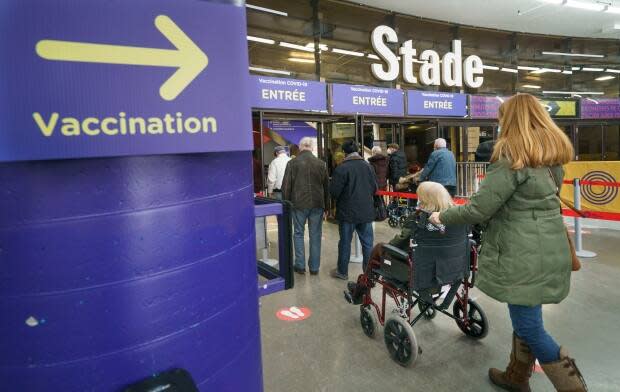With third wave possibly just weeks away in Montreal, rush is on to vaccinate elderly

Montreal health officials expect the city will be hit by a third wave of COVID-19 infections by next month and want to vaccinate as many elderly residents as possible before then.
The next wave of infections will likely be driven by new variants of the coronavirus, which are progressively becoming more prevalent in the city, Montreal's public health director, Dr. Mylène Drouin, said Wednesday.
She estimated that while new cases have currently plateaued in Montreal they will rise again, possibly as early as late March or early April.
But Drouin said public health teams have adopted a more aggressive approach to treating suspected cases, with the goal of delaying the onset of the third wave by perhaps two or three weeks.
That would buy authorities more time to vaccinate segments of the population most at risk of requiring hospitalization — or dying — from the disease.
"If the wave comes at the end of March or the beginning of April, and the variant is predominant, we will have at least protected a we will have at least protected a large part of the vulnerable population," Drouin said at a news conference.
"And obviously our goal is to push the wave back to mid-April. That would be better."
Added measures aimed at slowing transmission include widening the ring of contacts who are required to isolate when a variant has been detected.
The city is also treating even one case of a variant in a school as an outbreak, prompting more widespread testing. Of the 324 active outbreaks in the city, 43 of them are in schools.
"We are seeing a pattern of transmission that is outbreaks in schools and high transmission in the household," Drouin said.
Moving toward endemic transmission?
A mass vaccination campaign has been underway across the province since Monday, though the Health Ministry is paying particular attention to the situation in Montreal.
So far, an estimated 35 per cent of Montreal residents over the age of 80 have received at least one dose of a COVID-19 vaccine. Among residents 70-79 years old, 11 per cent have received a shot.
By March 15, vaccination appointments will be available at dozens of pharmacies in the city, as well as at the large clinics that have been set up in arenas, conference centres and the Olympic Stadium.

Though restrictions will be loosened outside the greater Montreal area next week, officials hinted strongly that the city will remain a red zone for some time.
Drouin said more time was needed to analyze the effect this week's spring break will have on transmission rates before public health measures could be relaxed safely in Montreal.
She outlined a possible scenario for Montreal which she described as "endemic" transmission. As growing numbers of older Montrealers get vaccinated, it's possible the virus would circulate mainly among age groups where complications are rare.
"We would come to accept a certain amount of transmission," Drouin said. "Will we continue to need significant confinement measures? Well, it will depend on how many people have been vaccinated when we see an increase in cases."
Some tips for a safe trip to a vaccine appointment
Earlier this week, as the mass vaccination campaign got underway, there were reports of long lines outside some clinics.
Health officials reiterated their request for people not to show up more than 10 minutes before their vaccination appointment.
"We want to avoid crowds forming at these sites," said Lynne McVey, head of the West Island health authority.
For those accompanying seniors to appointments, Drouin stressed the need to remain cautious about spreading the virus.
If driving, for instance, crack a window and have the passenger remain in the back seat, she said. Drouin also reminded people who have received the vaccine that it can take up to three weeks for the immunity to develop.
"The vaccine is not magic," she said. "Until there is collective immunity, we have to respect the measures in place."

